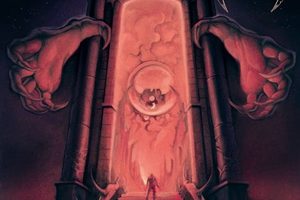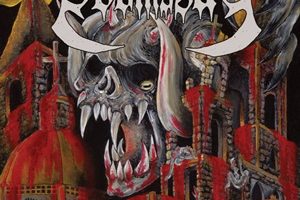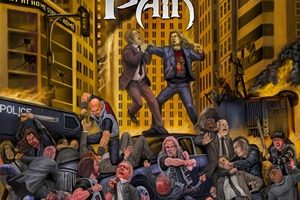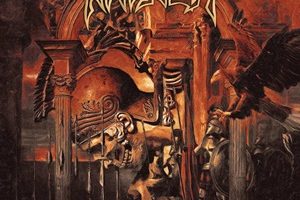Author D.X. Ferris Chronicles the Enigma That is Slayer
Sunday, 12th January 2014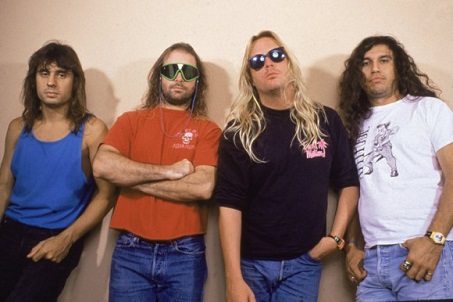
Two noticeably career-shaking events happened to Slayer last year: Drummer Dave Lombardo bolted before a run of Australian dates, and guitarist Jeff Hanneman passed away in May. For a band that had gone the better part of its career without any real runs of dramarama, the confidence in the band for some, was shaken. And rightfully so; Slayer has largely kept both its lineup and core sound intact since their 1981 formation, and while there have been some occasional blips (see: Bostaph for Lombardo, the mess that is Diabolus in Musica), reliability and Slayer were conjoined entities. As of early 2014, there is some argument to the band shutting down shop entirely based on what happened in 2013 alone…
Up until recently, the band’s career has lacked the all-inclusive tome it was so deserving of. Joel McIver’s 2010 Bloody Reign of Slayer had its moments, but PA-based author D.X. Ferris has gone the extra mile with Slayer 66 2/3: The Jeff & Dave Years. Across 59 chapters (!), Ferris hits upon every critical (and not-so critical) aspect of the band’s career, including their brash early Metal Blade days, through the galvanizing Reign in Blood/South of Heaven days, to those unforgiving 90’s, all the way to today, where he takes in-depth look at the complicated relationship between Lombardo and the rest of the band. If anything, one will come away learning a lot more about a band who has been purposely reclusive.
Currently full-go on the promotional tour (the book was released late last year), Ferris was kind enough to submit to our queries, and even provide an excerpt of the book, which can be found here. For now, here’s what transpired:
Dead Rhetoric: Last year…the worst year for the band? Even worse than some of those uninspiring mid-90’s days, or even through the Diabolus era?
D.X. Ferris: 2013 was the worst year in terms of earth-shattering loss. Lombardo is fired. Hanneman dies. When I wrote my first Slayer book, the miracle of the band was that it was the same four people. Now, like so many other groups, it became two of the original guys, plus their backup. But they held it together. Slayer is still alive.
But all in all, I’d say the mid-90s were worse. By 1993 and those awful soundtrack songs, I had lost faith in the group. They seemed creatively bankrupt. You can argue about how good those next two records, Divine and Diabolus, are. But at least in 2013, the band didn’t leave any black marks on their permanent record.
Speaking of Diabolus, that album was one of the many reevaluations that I experienced over the process of writing the book. I loved the record when it came out. Loved it. I’ve been defending it vehemently for 15 years. And I hated God Hates Us All when it came out. And I had expected to repeat my longrunning arguments in the new book. But I found that, to my ears, Diabolus does not hold up well. And God Hates sounds much better to me than it ever did. So even if you think you know the catalog, go back and take a close listen. Maybe Undisputed Attitude sounds better than you think it did.
Dead Rhetoric: Outside of the drummer changes, the core of Slayer has remained largely intact throughout their career. For a band with such minimal lineup changes, do you find over the course of putting the book together that the band’s dynamic was more complex than meets the eye?
Ferris: It’s a very complicated dynamic. As an outsider, it’s tempting to project your values onto the band. But like I said, they don’t think like we do, and they don’t act like we do. And they don’t have to, and they shouldn’t.
So it’s natural for fans to say “Kerry should have communicated with Dave better.” And maybe some people would say, “They should have sat down and told Jeff he was very special and they cared about him and he needed to get help.” But Slayer have a dynamic that’s like a dysfunctional family. After 30 years of history, they’re all wired together in ways that might seem unusual to us. But it’s not our situation; it’s not our family; we weren’t there. Most people probably have a relationship with a relative that doesn’t make any sense to anybody else.
It seems to me that a certain amount of tension is good for the creative process. It keeps everybody on point. Everybody wants to be at his best and outshine the other guy. But at a certain point, that backfires, too. It seems like the band resented Dave’s acclaim as one of the better drummers ever, if not the best metal drummer. So after Reign, he played even better, but his instrument was never featured as prominently as it was in, say, “Angel of Death.”
Over 32 years, the relationships shifted, the lineup shifted, the roles shifted, their influences changed. So it’s a very dynamic dynamic. I mapped it out as best as I could. In my experience, sometimes the band themselves can’t give you a clear explanation of why certain things happened.
Dead Rhetoric: You detailed Lombardo’s relationship “issues” in the previous book. Circling back to them again, why do you think they’ve been such a burden for him? You don’t hear similar stories for other drummers…
Ferris: The terrible aspect of Lombardo’s relationship with the band… a lot of writers would incorrectly call it “tragic,” but I understand why they’d be tempted to use the word. He’s the best metal drummer, and has always been the most acclaimed musician in the band. He’s the only guy with a real body of work outside the group. But within his own band, he was, by far, the low man on the totem pole. He wasn’t one of the guys.
So that must have been incredibly frustrating for him. And he never received a single songwriting credit. Not one. And between 1994 and 1998, Bostaph received two. But for Dave… 30 years, how many albums, how many songs, how many memorable drum parts, and the group never once said, “Dave really helped this song come together.” That pissed Lombardo off early on, and it never went away. So he’s the king everywhere — except his own home. He got less credit, he got less respect, and he got less money. And he got tired of it. Early. By 1986.
So Dave is the most acclaimed musician. But Kerry is the team captain. And here’s Dave, this constant thorn in your side, constantly being held up as an iconic metal figure. And once Dave was a buzzing bee in Kerry’s ear… Kerry’s patience ran out at a certain point. Is that the best thing for the art? I don’t think so; I think Slayer is diminished without Dave. Is that the best thing for the band? Maybe we can’t say. Apparently, it’s what was necessary to keep the machine running.
Pages: 1 2











